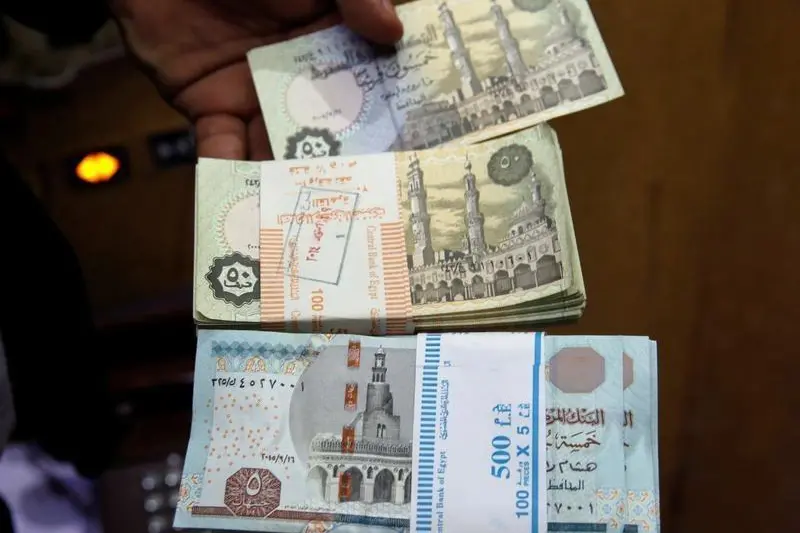PHOTO
LONDON - Investors are gearing up to jump back into Egypt's domestic bond market after a much-needed rate hike, a pledge to float the currency and fresh backing from Gulf investors and the International Monetary Fund.
Egypt's local government bonds had been off limits to most international investors in recent years amid fears over currency devaluations, deeply negative rates and concerns about repatriating funds from a country gripped by severe dollar shortages.
Over the course of just two weeks, a $35 billion United Arab Emirates investment deal and an enhanced $8 billion loan from the IMF that followed a 600-basis point interest rate hike and foreign exchange shift, have placed the North African country's local fixed income market back in the limelight.
Late on Thursday, credit rating agency Moody's revised its outlook on Egypt to positive from negative citing "significant official and bilateral support" and "policy steps taken in the past week," while affirming a Caa1 rating that still considers the sovereign a very high credit risk.
"It certainly has been a very positive momentum for Egyptian policy makers, for the country, for the economy that all these things have come together," said Joe Delvaux, portfolio manager at Amundi, Europe's largest asset manager, adding the firm was "certainly considering" going back into local government bonds.
Wall Street bank JPMorgan recommended buying one-year Egyptian T-bills at an auction on Thursday.
"The Egypt carry trade is back in focus and this time should be different," the bank's Gbolahan Taiwo wrote in a note to clients.
At the auction, the central bank sold 87.8 billion Egyptian pounds ($1.78 billion) of one-year T-Bills after receiving bids for nearly three times that amount.
While the central bank does not publish data on who bought the bonds, three bankers in Egypt told Reuters that foreign investors had taken part for the first time following a long absence. A comparable auction earlier this week and prior to the devaluation saw the central bank sell 56.7 billion Egyptian pounds of one-year T-Bills.
Recent events had revived "the near-term investment thesis in Egyptian risk assets," Farouk Soussa at Goldman Sachs told clients in a note published on Thursday.
Wednesday's devaluation was Egypt's fourth in two years, with policymakers' previous pledges to make the currency regime more flexible fading as soon as pressure on the pound flared up.
LINCHPIN
This time, analysts point to the sheer size of the influx of financing from official and private sector lenders on the cards.
Egypt already received $10 billion from the United Arab Emirates for the Ras al-Hikma property development deal and is converting another $5 billion in existing deposits as part of the agreement. The IMF's latest staff-level agreement on the combined first and second review is expected to be signed off before month-end by the fund's executive board, triggering another cash windfall.
The country's geopolitical significance bolstered its case for support, especially in the wake of the Oct. 7 Hamas attack on Israel and subsequent war.
"Egypt's linchpin position as a security anchor in the region has been reaffirmed," said Tim Ash at BlueBay Asset Management.
"That's been reflected in the speed, the fact that the IMF have come back to the table, and I think moderated some of the conditionality. And the fact that some of the UAE guys are bothering."
Having slumped to a record low beyond 50 to the U.S. dollar on Wednesday after the central bank announced its measures, the Egyptian pound held steady at just above 49 to the dollar, LSEG data showed.
Goldman Sachs calculated the latest devaluation had taken the real effective exchange rate - a commonly used measure of a currency's value - some 40% below its long-run average, delivering a larger devaluation than any of the previous adjustments.
In the near-term, the currency could appreciate to the low 40s, the bank added, taking away some risk for investors holding the assets.
Meanwhile, one-year T-Bills at Thursday's auction had a weighted average yield of 32.303% - a clear mark up for investors over the 29.9% yield comparable notes offered in secondary market trading, according to LSEG data.
But not everyone is quite so bullish. JPMorgan only just excluded Egypt's government bonds from its influential GBI-EM emerging market government bond index, effective Jan. 31, over material FX convertibility issues.
"Clearly the level of the pound was wildly unsustainable and the devaluation is welcome," said Paul McNamara, investment director at GAM Investments.
"The improvement in the external balance means that this devaluation/rate hikes combination can potentially be sustained; so like most investors - I suspect - we'll be waiting for signs of a will to follow through before getting involved."
($1 = 49.3000 Egyptian pounds)
(Reporting by Karin Strohecker, additional reporting by Jorgelina do Rosario, Marc Jones, Rodrigo Campos and Libby George; Editing by Kirsten Donovan and Jamie Freed)





















